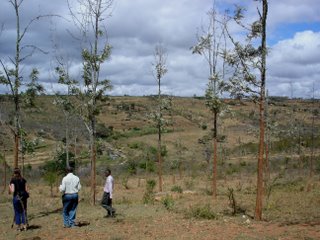Post-colonialsim and life around Nairobi

So I'm not really roughing it in Kenya, especially in Nairobi, because I am living with a Canadian. I enjoy her company here, so I am not feeling the same isolation as before. But at the same time I love going to the Kisumu house and the traveling because then I feel like I am really in Kenya.
But I like I said, I'm not living in the bush. In fact, I am living quite well, in a very nice little apartment in a safe area in Nairobi. It is easy and cheap to live well here which is probably why there is a considerable amount of international workers here. There is a whole other side to Nairobi for many of these people, the ex-patriots who make large salaries and live very very well here and are known for their elaborate parties. It actually really upsets me, because when you wonder why nothing ever changes in Africa, despite millions of dollars in aid, all you have to look to is where the money is actually going. Usually it is to the administrative and scientific staff and rarely to Africans. I heard that the average salary for a scientist here is $140,000 plus maids and all expenses paid a year. As if that weren't a lot in the US, that is a killing over here where you can pay a maid $50/month to live at your house and do everything for you. I would think they would get paid less because things are so much cheaper here. And I think that it is as corrput as the governments that also pay themselves too highly. I don't think it means that these institutions aren't good, but it means that unless something changes in how the money is handed out, I don't see the situation changing any time soon.
Because if that money were actually put towards doing the work, it could move mountains. This is post-colonialism colonialism.
Maybe I am an idealist, but I don't think it is wrong to think that things should be more fair and I know my Kenyan friends more than agree. Should I get paid 200x the wage of a Kenyan just because I am coming from America?
At least the scientist funding me is from Malaysia and is very critical about the whole thing as well. He is also much more action orientated, thus the video. I have talked with my Kenyan friends about how I want to do a documentary here about the corruption of international organizations. Unfortunatly I doubt they'd fund that one.
Life in Kenya is not very egalitarian.

This brain-looking thing is tamarind fruit, which you may know from tamarind candies in Mexico. We bought it at the Indian market and used it to make tamarind sauce by squeezing the brown juice off the stringy stalk and mixing it will red chilies and sugar. It goes really well with sweet potato french fries.

I really liked this cow being transported on the highway in the back of a pickup. And highways are nuts here, so I can only imagine the terror that cow must feel.












